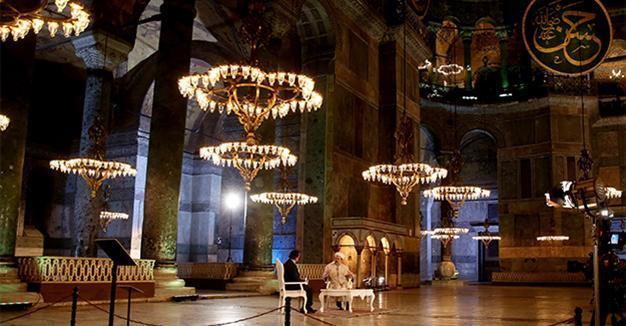Turkey says Greek response to Quran reading in Hagia Sophia ‘unacceptable’
ANKARA

AA photo
The Turkish Foreign Ministry has released a statement in response to a Greek condemnation of reading the Quran in the Hagia Sophia in Istanbul throughout the Muslim holy month of Ramadan, defining Athens’ reaction as “unacceptable.”
“The Greek Foreign Ministry’s statement with regards to TRT Diyanet TV’s [the Religious Affairs Directorate’s channel on a Turkish broadcaster] sahur [the meal before dawn during Ramadan] program entitled ‘Hagia Sophia at the time of abundance,’ which will be broadcast throughout the month of Ramadan, is unacceptable,” Foreign Ministry Spokesperson Tanju Bilgiç said in a written statement released on June 8.
Bilgiç called for “common sense” in Greece’s tone and statements, accusing Turkey’s Aegean neighbor of “mistaking anti-Islamism with contemporaneity.”
Greece has not permitted the construction of a mosque in its capital for years, Bilgiç said, adding the country also intervened against the religious freedoms of the Turkish minority in western Thrace.
“In this regard, we would like to remind [Greece] that respecting other religions and their forms of worship is among the values of contemporary, democratic and secular societies,” the statement added.
The controversy was initiated when the Greek Foreign Ministry released a statement on June 6 “condemning” the announcement of scheduled Quran readings at the Hagia Sophia as “regressive.”
“Obsessions, verging on bigotry, with Muslim rituals in a monument of world cultural heritage are incomprehensible and reveal a lack of respect for and connection with reality,” Athens’ statement said, claiming the practice contradicted the values of modern, democratic and secular societies.
The first guest of the TRT program on June 6 was Diyanet head Mehmet Görmez, who expressed his “excitement” for the first sahur in Hagia Sophia.
“This is a place that raised numerous scientists, people of letters, many important people,” Görmez said, wishing god’s mercy and grace upon all the ancestors who died between Istanbul’s conquest and the beginning of this century.
Originally built as a 6th century Christian basilica, Hagia Sophia was converted into an imperial mosque in the 15th century after the Ottoman conquest of Istanbul.
Now serving as a museum, there are still demands by Islamists to once again convert the museum into a mosque.
On May 28, a day before massive celebrations for the 563rd anniversary of the city’s conquest, hundreds of Islamists prayed at the gates of Istanbul’s world famous Hagia Sophia in order to demand the right to pray there as part of an event called the “conquest prayer.”
An imam led a prayer in front of the vast building while crowds chanted for the opening of Hagia Sophia.
